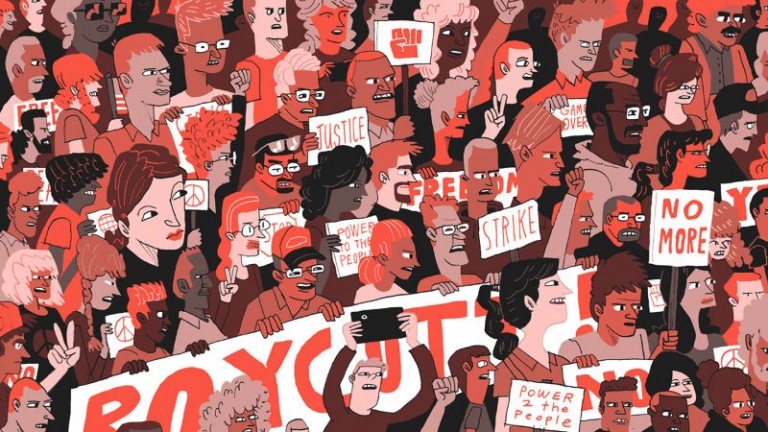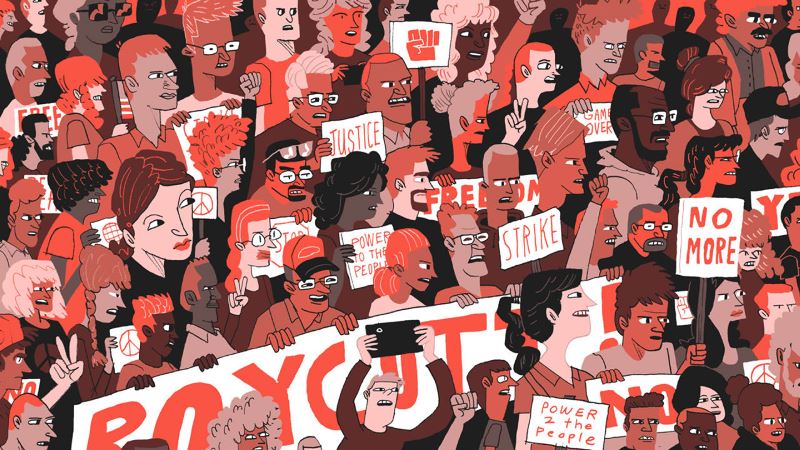POLITICS
From artists, activists, film directors to students and the media- everybody seems to be debating the dangers to political dissent in India and it implications for the sustainability of democracy. A young scholar takes a journey of interrogating and reconceptualising dissent in our times.
Sukanya Khar is pursuing her Masters in Political Science/University of Delhi.

[dropcap]D[/dropcap]issent is a concept and its practice is closely linked to right to liberty and freedom of speech and expression. In a large, plural society like India, diversity in thought and opinions is inevitable. Therefore, conflicts and opposing views would be an intrinsic feature for a plural society. However, the idea of dissent is being questioned; what is dissent and what forms are acceptable is a contested issue. It is important that dissent should not simmer at the social level but it should become part of the political scenarios and encourage people to ponder over the idea of dissent, its desirability, and impact.In order to understand dissent, it is essential to first comprehend the nuances and multi dimensionality of democracy. A prior understanding of democracy can make us more tolerant to dissent.
It is not only politics that is democratic by means of free and fair elections. A democracy is meaningful only when the ‘social’ is politicized into the political processes of a state.
To be politicized means formation of opinion which signifies a thought process and awareness of political processes. These opinions and streams of thought can often conflict with each other, as well as the state, and thus dissent in born.
However a pessimistic view of dissent as ‘disagreements’, ‘agree to disagree’; or a myopic view that it is like two parallel roads that never meet’ should be resisted. Dissent is not just disagreements; it is also a process that provides alternatives and multiple perspectives on a range of issues from governance to public policies, human conflicts etc. The profound idea that the bedrock of a democratic republic is that it does not dismiss dissent and attack dissenters, but welcomes it, is to be strengthened to nurture democracy.
It is largely observed that dissent can also be understood as ‘quiet defiance’. It need not always have the noise or the jubilance of a social movement/ protest. An offbeat Bollywood film, Lipstick Under My Burkha portrayed the quiet ways in which four women struggled to challenge orthodoxies that defied them freedom and opportunity to explore life and take their own decisions. However it is the social spread of the democratic values in terms of dignity and respect for all human beings that motivated these women to contradict widely held views about who and what a woman is; thereby implying that dissent can also mean hope and inspiration.
Absence of dissent and the disaster it entails can also be understood through some futuristic films. Movies like The Hunger Games and Blade Runner 2049 (2017) reflect on the repressions in a dystopia in which governments are autocratic, detached from the people, and treats its people like robots who can be subjected to arbitrary rules and commands.
We have a culture of accepting and bearing the yoke of suffering in silence. This has led to repression and stagnation of evolution which is the foundation of a civilization. Breaking the silence in the form of dissent is not so easily acceptable. Media and certain movies have aided the process of breaking this silence.
The movie Spotlight unearthed rampant sexual abuse by the Catholic Church, and the silence over it. The Jolly LLB series highlights moral corruption in the judiciary and how it disillusions common people who have faith and trust in it.
Popular imagination can also, therefore, aid the process of dissent covertly. The ideas of progress, modernization and development need to be reconceptualised in popular imagination too, not just in academic circles. Dissent can be a tool to do this as it allows critiques, debates and contestation. Similarly modernization is not just erecting malls, dams and high GDP growth, it is also inclusion, diversity, dignity justice and equality. Dissent should be understood as an intrinsic human feature. Prevalence of dissent can enable to engage critically with our environment and find newer and progressive ways to move ahead.
Dissent in a democratic set up can be an improvement on human nature. It can enable us to think creatively, to empathize; if we learn to listen, to articulate with peace and not aggression, we instil democracy within ourselves, and not just in the body politic. Thus, dissent also means creativity. It can signify a ‘thinking’ individual, who wishes to affirm his/her individuality. It delineates an individual’s/ group’s desire to explore and find newer ways to manifest.
Expressions of dissent can however go awry, too. The acceptable forms of dissent are another debatable issue. In a democracy, use of violence and aggression as forms of dissent such as destruction of public property and vigilantism are unacceptable. The Constitution lays down the contours of acceptability of dissent. However, they are manipulated and misused by the state as well as individuals/groups, delineating ignorance of ideals of democracy. A state is therefore democratic only when it creates legitimate forums and means by which individuals/civil society can express its concerns.
The state corrodes its power instead of consolidating it if it insulates itself from question and criticisms. The state exists for its people, and it is its primary responsibility to listen and be answerable to them. Branding dissenters as ‘anti nationals’ or ‘Urban Naxals’, in fact, reeks of lingering colonialism.
In the context of democracy, it is important to understand that a state, its institutions, and its culture are never built with a singular idea, and monoliths, or according to the diktats of an individual.
The genesis of ‘India’ lies in debates and contestations. The Constitution of India is itself a culmination of differing views and ideas as to how a nation must run and what values it must espouse. Dissent therefore can also mean amalgamation; it can lead to the birth of new ideas and new discoveries. The Constitution lays down a multitude of principles, values and norms, which have, over the course of India’s history, been reinvented by judicial interpretations.
Dissent also means collision with power and powerful. One of the powerful entities is the state. Since a state wields immense power, in absence of opposition, it can unleash great terror. Recently, a Supreme Court judge remarked that dissent is the ‘safety valve of a democracy’. He drew upon this analogy to highlight the fact that dissent is complementary to democracy. A democratic set-up denotes a specific relation between the citizens/civil society and the state which allows them to hold the state accountable and critique it if it goes astray. If dissent is stifled, the country would be in mayhem.
It is essential to remember that current forms and ideas of ‘democracy’ and democratic government and governance, are significant improvements over previous methods of governance. Like an artist, who, with dedication, skill and patience creates magnificence, a society too needs to be patient and strive to inculcate values amongst members of society as enshrined in the Constitution.
A continued transaction, therefore between people/civil society and state is essential. In order to translate the abstract of democracy into meaningful practices and constitute it as a way of life, the state must listen to those who dissent.













